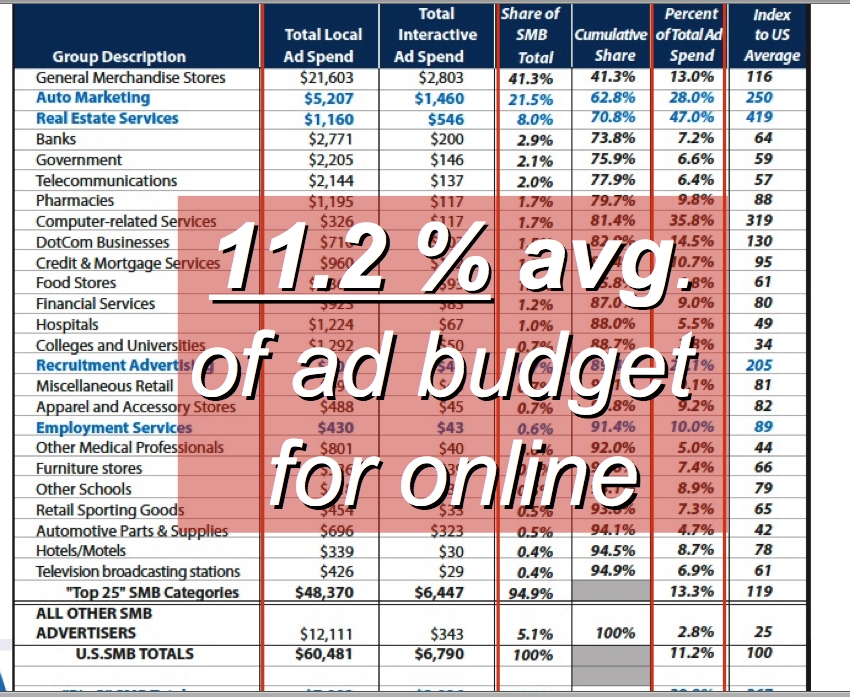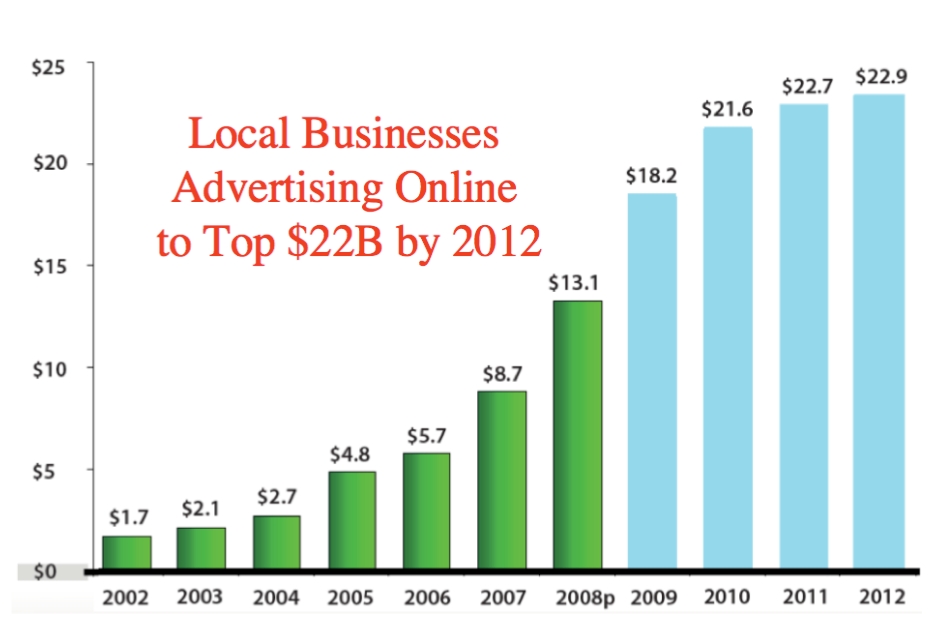Put on a Digital Advertising Seminar
It is not as hard as it looks! Digital advertising seminars have dual purposes: They bring in new dollars and position media teams as digital experts. This is especially powerful for legacy media sales organizations rebranding from product peddlers to digital experts.
We surveyed three digital managers who hold seminars including Julie Witthoeft, of Petoskynews.com, whose sales team has a 50% close rate from seminars; Chad Irani, of Palm Beach Post, whose team signs up 90% of attendees for free site reviews, and we attended one of Blinder Group's seminars for Greenspun Media that attracted 162 small business attendees to see how he does it. Here are four keys to creating great advertiser workshops:
1.Whether to use an outside consultant, and if not, who?
Consultants such as Blinder Group can be valuable in launching the first advertiser seminar. An outside expert gets higher attendance, ie the "visiting expert" phenomenon, especially if properly promoted. Having gone through the experience once, even an inexperienced team can model the next seminar. Blinder provides a logistical schedule of what needs to be done eight weeks out, four weeks out and so on, to make sure the train stays on the tracks.
Also, from a shere dollars-in perspective, consultants like Blinder can generate a large spike in revenues ($100,000 plus in an individual market with some groups raking in more than $1 million) or quickly launch new products such as directories or small business combo packages. As one sales manager from Freedom newspapers put it, the extra urgency to the sales drive can be worth the price.
The downside according ad directors we talked to is that closing fast using a charismatic outsider creates higher churn. Results-oriented campaigns with agreed upon ROI targets have better retention; even organizations which use consultants, combine their techniques with internal practices.
For organizations with fewer resources, almost anyone in the department can springboard a seminar. Petoskeynews.com uses an especially charismatic digital specialist, Jeff Johnson. PalmBeachPost.com relies on its own sales team, turning them into "local celebrities."
2. Getting businesses to show up
The key to a good turn-out is partnering with a Chamber of Commerce or other merchant association, preferably at an event that already has attendees. Blinder suggests to “put a price on it and let the members get in for free.” There is a list of successful postcard-type invites at Blindergroup.com/invites.
Another proven technique, he said, is to hand out $5 spiff to sales reps for every client they bring to the seminar. Expect only 50% of RSVP’s to actually show. Seminars that rely soley on media promotions rather than business associations usually attract attendees with very small, home-based and mom-and-pop businesses looking more for personal education than ways to invest wisely in marketing.
3. Stick to the basics and keep messages simple
Expect business owners who do understand basic internet concepts and terminology, and label them Advertising 101 to make sure more sophisticated advertisers are not disappointed. Do use powerpoint with simple “ billboard style” messages on each slide, colorful images, metaphors and quotes.
Part one of the seminar builds interest: Give statistics about how dollars and consumers are shifting online. Blinder uses a Wayne Gretsky quote, “I skate to where the puck is going” as a metaphor for successful businesses spending money where readers are looking. Using charts from Borrell and Associates - or even better, market specific research - is a good lead in.
Johnson also uses short quotes and "simple stats on reaching critical mass," to start off the topic.
Part two of the seminar addresses how internet advertising works, including common terminology - what is a page view, what is a visitor - and types of online advertising. "Don't over-estimate what small businesses know. They think they should know at this point, but are afraid to get their feet wet," says Witthoeft, of Petoskeynews.com.
Do address search and social media. As Blinder puts it, “You have to address Google; it’s the guerilla in the room.” Even if your organization does not sell search products, part of the seminar should walk through how to get a pin on the Google map, the basics of PPC and ways to use Facebook. A visual of the sales funnel and how digital products reach passive and active audiences is another way to convey the difference between types of products.
Other topics: The importance of having a great offer that links to a splash page; the strength of video in the search engines (Blinder shows his attendees how his YouTube video is responsible for his position at the top of the search results for key words media sales training); the inclusion of key words on the title page of a business web page; and examples of digital ad campaigns that generated exceptional results.
Remember, this is educational, positioning your team has having valuable knowledge, being people the advertisers will want to talk to.
Part three of the seminar varies the most, since it is the set up for a close or "sign-up" of some kind.
Palmbeachpost.com puts on soft-sell informational seminars that end with looking at “what makes a good web site?” At the end of the seminar, the call to action is simply asking attendees to sign up for a free review of their web site. Chadi Irani, Ad Director, says the softer close gets 90% appointments of which about 10% convert to advertising sales.
Johnson ends his seminars with examples of rich media ads and an overview of IAB units, followed by his own site stats and packages and "a soft sell approach at the end."
The Greenspun Media Group ad seminar started with Blinder, then the last part was given by Rob Curley, interactive director, who showed neighborhood “home pages” that visitors can create by inputing their zip code and selecting the widgets they would like to see. The sales manager, Lani Dorlack, then outlined the three packages. She reported that about 80% of the 160 attendees agreed to a follow-up appointment with sales representatives strategically placed around the room.
4. Turning attendees into advertisers
Decide the purpose of the seminar in advance. Is it educational and intended to rebrand the company? Launch a product? Gain a quick sales spike? Blinder says leads are stale after four days, so getting the follow-up is key. Everyone who does these seminars agrees that the client needs to take some kind of action while they are still in the room.
If the goal is direct sales, the next decision is whether to close in the room, or on the next call (ie one call or two).
A soft-sell version of the two call close is to have attendees fill out an evaluation form, with the last question asking if they would like to hear more about the benefits of digital advertising. At Blinder’s workshops 65% say “yes” and of these about 85% close later with a Blinder associate on scheduled follow-ups.
A faster, “one call close” option that Blinder sometimes uses is to have a “limited offer” to, say, the first 25 of the attendees in the room. The “limited availablity” produces the highest close rates.
The Sentinal-Record put together a package for its Blinder seminar that included an enhanced directory profile page, coupon and one advertorial in the middle of print coupon page. The package was offered to 30 “charter “ advertisers for $59 a week. All 30 sold out, Blinder says.
Finally, some media companies who purchased Borrell’s research showing online ad spending in their market tell businesses that if they stay after the seminar to they will be able to look at the data for their area and industry. Sales reps are waiting with the data in folders. “We tell them the folders are very proprietary, and can't leave the room, but we can show them the information at the end of the seminar,” Blinder says. These conversations get the advertiser staying and talking to sales representatives for up to an hour after the end meeting, enough time to make sales or set up follow-up calls.
Conclusion
Advertiser seminars are so effective that some organizations who do them host a seminar every two weeks. Our recommendation is that every sales group should try at least one a year for interested sales representatives and set up at least one annual marketing meeting for Chamber members, in which new products and strategies are discussed with large groups of advertisers.
For more ideas on slides or to contact the Blinder Group go to blindergroup.com/bootcamp. Thanks also to Julie Witthoeft and Jeff Johnson of Petoskeynews.com a Schurz Communications site, Chadi Irani of PalmBeachPost.com and Lani Dorlack of Greenspun Interactive for sharing their success.









